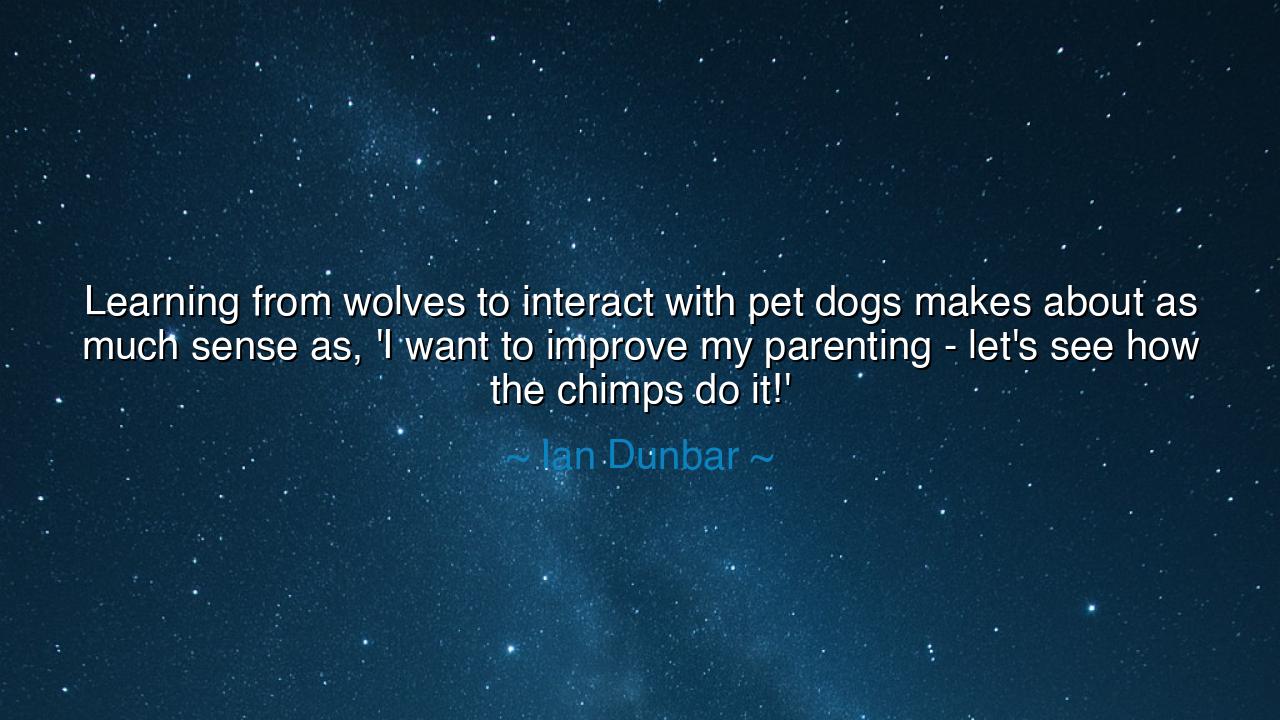
Learning from wolves to interact with pet dogs makes about as
Learning from wolves to interact with pet dogs makes about as much sense as, 'I want to improve my parenting - let's see how the chimps do it!'






The words of Ian Dunbar strike with wit yet carry profound wisdom: “Learning from wolves to interact with pet dogs makes about as much sense as, 'I want to improve my parenting—let's see how the chimps do it!'” In this, he unmasks a common folly of human thought—that by studying one species, one context, one tradition, we can blindly apply its ways to another. Dunbar’s humor is sharp, yet his message is ancient: wisdom lies not in imitation alone, but in discernment, in knowing the difference between what is similar and what is truly the same.
The ancients warned against this confusion. They taught that every creature, every people, every age has its own nature, its own rhythm, its own laws. To impose the laws of the wolf upon the heart of the dog is as misguided as imposing the instincts of the chimpanzee upon the art of parenting. Both may share roots, both may share resemblance, but their spirits are not identical. Dunbar calls us to humility: to see that wisdom requires understanding what is unique, not just what is familiar.
Consider the life of the philosopher Aristotle, who once sought to classify all creatures. He erred at times, for he believed some animals lacked reason or memory, misjudging their true nature. Yet his greater teaching remains true: each being must be studied according to its own essence. Just as one would not judge a fish by its ability to climb a tree, one cannot judge a dog by the ways of a wolf, nor raise a child by mimicking the habits of wild beasts. To do so is to misunderstand both the creature and oneself.
Dunbar’s words also hold deeper meaning for the human heart. In matters of parenting, too many seek easy answers in comparison—“This is how others do it; this is how nature does it; this is how tradition dictates.” But true parenting is not imitation of another species or another household; it is a living relationship, tailored to the child before you. To learn from others is good, but to copy blindly is folly. The parent, like the teacher, must discern what fits their child, their time, their home.
History offers a striking mirror in the story of Jean-Jacques Rousseau, who in Émile argued for raising children according to their nature rather than rigid traditions. He saw that children are not miniature adults, nor beasts of burden, but beings with their own rhythms of growth. His insight echoes Dunbar’s jest: to raise children by copying chimps would be absurd, for the child is human, requiring human understanding. In the same way, the dog, though kin to the wolf, requires training born of companionship, not of dominance.
The wisdom here is clear: discernment is the heart of wisdom. Not every similarity is sameness. To care for animals, for children, for communities, one must honor what is unique about them. Wolves teach us about wolves; chimps teach us about chimps. But to raise a dog or a child, we must look at the creature before us and ask: who are you, and what do you need from me? This is the path of true guidance.
The lesson for us is simple but powerful: do not be seduced by easy comparisons. In your parenting, in your teaching, in your leading, seek not to mimic blindly but to understand deeply. Study the one you care for—not an idea, not a stereotype, but the living being before you. Ask not, “What do wolves do?” but “What does my dog need?” Ask not, “What do chimps do?” but “What does my child need?” This is the discipline of love: to see clearly, to honor difference, to guide wisely.
Thus, Dunbar’s humorous words endure as an ancient-sounding maxim: do not confuse resemblance with identity, nor similarity with sameness. To love truly is to know, and to know truly is to see what stands before you, not what stands beside it. In this, both dogs and children—and indeed all who depend upon us—are given the gift they need most: care that honors their nature, not someone else’s.






AAdministratorAdministrator
Welcome, honored guests. Please leave a comment, we will respond soon